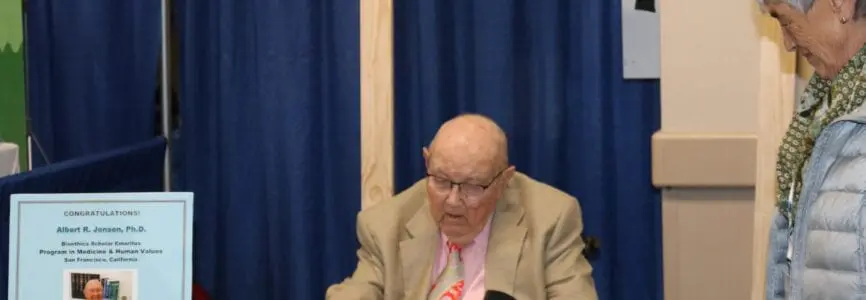Hastings Center News
A Tribute to Albert Jonsen
The Hastings Center is saddened by the death of Albert Jonsen, a leader in the field of bioethics, on October 21 at the age of 89. He was a Hastings Center fellow and a recipient of The Hastings Center’s 2017 Henry Knowles Beecher Award for lifetime achievement in bioethics.
Jonsen was emeritus professor of ethics in medicine at the University of Washington School of Medicine, where he was chairman of the department of medical history and ethics from 1987 to 1999. He was also a senior bioethics scholar-in-residence emeritus at California Pacific Medical Center in San Francisco. From 1972 to 1987, he was chief of the division of medical ethics in the School of Medicine at the University of California, San Francisco. Prior to that, he was president of the University of San Francisco, where he taught in the departments of philosophy and theology.
“Al Jonsen—a polymathic scholar, visionary leader, and jovial raconteur—was one of the midwives for the birth of bioethics and a valued participant in many of the events of its infancy and adolescence” said Alex Capron, the University Professor, Scott H. Bice Chair in Healthcare Law, Policy and Ethics and a professor of law and medicine and codirector of the Pacific Center for Health Policy and Ethics at the University of Southern California, who is a Hastings Center fellow. “As a former seminarian and university president, he brought a different set of experiences and a breadth of knowledge to the early meetings of The Hastings Center, but he also pioneered the development of a different model for bioethics activities, namely one situated within a medical school, first at UCSF and then at the University of Washington. Al focused on producing scholarship, educating medical students, and above all helping physicians and nurses grapple with the ethical choices arising in their clinical activities. He was an invaluable member of both the National Commission for the Protection of Human Subjects of Biomedical and Behavioral Research and of the President’s Commission for the Study of Ethical Problems in Medicine and Biomedical and Behavioral Research, whose staff knew they could always count on him to provide thoughtful contributions to commission reports and provide clarity when confusion arose during commission meetings.”
In helping to establish bioethics, Jonsen focused on working in partnership with doctors to help them navigate ethical issues that they confronted in practice. “Al was prescient in foreshadowing the importance of what is now known as embedded ethics,” said Barbara Koenig, director of UCSF Program in Bioethics and a Hastings Center fellow, who was a student of Jonsen’s. “Not reflecting at a distance, but deeply engaged, fully understanding the ‘moral archeology’ of each specific clinical or research context.”
Jonsen and another former student–William Andereck, a physician–cofounded the Program in Medicine and Human Values at Sutter Health’s California Pacific Medical Center. The idea, wrote Andereck in Hastings Bioethics Forum, was to foster “a closer relationship between philosophers like Al, and the doctors in the trenches of a large metropolitan medical center.”
Jonsen is the author or co-author of 11 books, including Bioethics Beyond the Headlines: Who Lives? Who Dies? Who Decides? (2005), A Short History of Medical Ethics (1999), and The Birth of Bioethics (1998). He wrote chapters in more than 70 books on medicine and health care.
Jonsen received many honors, including the 2009 Harvey Meyerhoff Leadership Award from the Berman Institute of Bioethics at Johns Hopkins University “for lifelong commitment and contribution to the field of bioethics.” He also received a Lifetime Achievement Award for Contribution to Research Ethics from PRIM*R, Professional Responsibility in Medicine and Research. He was an elected member of the Health and Medicine Division of the National Academies of Sciences, Engineering, and Medicine.
In addition to his professional achievements, Jonsen had a lighter side. This was on display after he received The Hastings Center’s lifetime achievement award in 2017 at the annual meeting of the American Society for Bioethics and Humanities, when he sat at a desk signing copies of his book beneath a homemade sign that said, “The Ethicist is In, Advice 5 cents.”
Mildred Solomon, president of The Hastings Center, summed up the feelings so many in our field now feel on the occasion of this great loss: “Al Jonsen exhibited a rare combination of wisdom, bold leadership, great vision, conviviality, humor and humility. We will all miss him dearly.”

